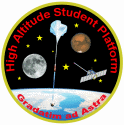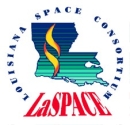



Payload 13 Information
Payload Flight Number:
Institution:
Payload Title:
Stratospheric Spectropolarimeter Gamma-X (SSGX)
Student Leader:
Faculty Advisor:
Payload class:
Large
Payload ID Number:
13
Mass:
Current:
Serial Downlink:
Analog Downlink:
Serial Commands:
Discrete Commands:
Payload Specification & Integration Plan
Due: 06/22/2018
Delivered:
Payload Integration Certification
Scheduled: 07/27/2018
Actual:
Flight Operation Plan
Due: 07/19/2018
Delivered:
Final Flight / Science Report
Due: 12/07/2018
Delivered:
Abstract:
Among the last frontiers of astronomy are the polarization measurements of x and gamma-rays, emitted from phenomena as diverse as gamma-ray bursts, pulsars, and active galactic nuclei. Our payload consists of a 4x4 pixel CdTe prototype developed to characterize background radiation in the 20-1000 keV energy range. Measuring double events is essential in determining Compton photons' new direction and therefore the polarization direction. The SSGX payload features both the CACTuS detection unit which previously launched from Italy in 2002 (recording single events), and an innovative electronic data collection system designed by ARC’s Physics and Astronomy Club. The Data Acquisition/Integrated Storage Interface (DAISI) is responsible for sampling detector analog voltages, supplying required voltages, monitoring system operation, regulating electronics temperature, responding to remote communication, and the continuous recording of acquired data as well as system status to permanent storage. While this may not be the “sexiest” of experiments, it is crucial to develop reliable calibration data for future instruments; further, this project provisions hands-on experience for undergraduates within an international collaboration. Our goal is thus to obtain, for the first time, a fine measurement of all background components (single, double, and multiple events) that can deteriorate a gamma-ray polarimeter response in space.
Payload Integration Plan:
Science Report:
|